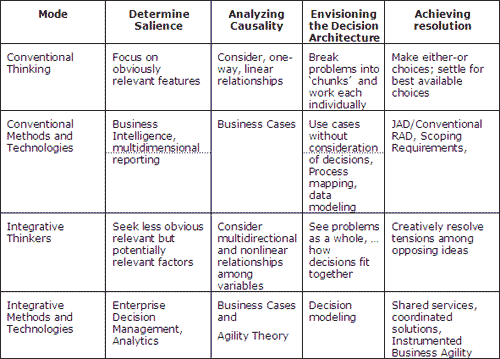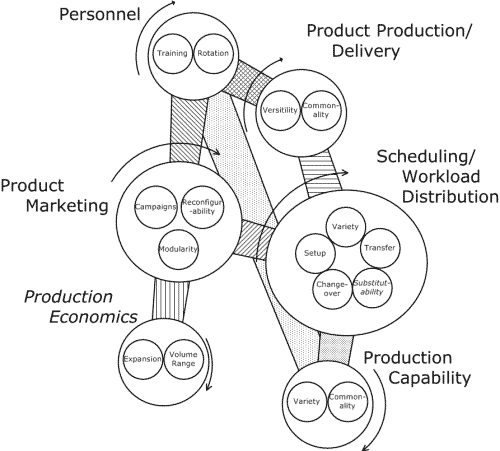From management and economic theories through technical architectures, many ideas offer the promise of creating a perfect realm for businesses competing in today’s globally networked world. Yet closing the gap between strategy and operation is demanding and ideas and technologies do not solve problems— disciplines and practices do. Roger Martin describes such as practice, integrative thinking, in an article entitled “How Successful Leaders Think” in the June 2007 issue of Harvard Business Review. He discovered that most successful leaders are integrative thinkers—that is, they can simultaneously hold, in their minds, two opposing ideas and then spawn a new idea that successfully merges and resolves elements of each.
As Martin notes, many may try to copy what effective leaders do. He says this focus is misplaced, because what works in one context may not in another. A more productive, though more difficult, approach is to look at how such leaders think. Naturally, given the nature of our work at the BPM Institute, there is an analogy in the technology choices of leading companies. Martin even states the integrative process of consideration and synthesis (rather than superior strategy or faultless execution) is a distinction of exceptional firms.
Martin described four stages in an interesting process that integrative thinkers (and firms) use to decide on and craft superior solutions. These are
- First discover the salient features of a problem
- Second, develop causality of the factors.
- Third, envision the decision architecture.
- Fourth, achieve resolution.
Clearly, besides the thinking, there are methodologies and technologies that provide input to the steps of this integrative process.
Integrative Thinkers, Integrative Methods
In the table below, I paraphrase Martin’s four steps to Integrative thinking and include technologies and methods that compare and contrast conventional and integrative approaches.

Conventional Thinking, Conventional Methods
In the conventional methods and technologies, problems are analyzed with simplistic ideas and solutions are ‘chucked’ into project plans with many independent parts that are poorly coordinated.
Integrative Thinking, Integrative Methods
I believe there are four methods and technologies that support integrative thinking:
- Enterprise Decision Management,
- Business Agility,
- Decision Modeling and
- Instrumented Business Agility
Enterprise Decision Management I have included enterprise decision management as an integrative technology, because it binds with the characteristics of both less obvious factors and multidimensional thinking. In their recent book, Smart (Enough) Systems Taylor and Raden state: “EDM is not about narrow learning, but about learning from experience in a broad and deep manner, and learning quickly.” EDM create a “learning infrastructure” that avoids simplistic ‘linear’ thinking about problem domains.
Because many EDM techniques empower a complex view of business performance and related factors, it supports the first step in integrative thinking: determine salience.
Business Agility Business agility is the ability of a business enterprise to run profitably in a rapidly changing fragmenting global market environment by producing quality, high-performance, and customer targeted goods and services. Agility Theory is a process of settling the scope and context of new strategies or performance problems in a business agile way.
Management theorists, such as Goldman and Preiss, have identified a series of agilities within an operating framework. Each of these contributes to a holistic view of a business model. I have covered the agility types in previous articles in for BPM institute. You can also read about these on my blog, tomdebevoise.com. However the major categories are:
- Product Marketing
- Production Economics
- Scheduling/Workload Distribution
- Product Production/Delivery
- Production Capability
- Personnel
The execution framework model in business agility works in a connected, dynamic manner. One view of the mechanism is shown in the diagram below.

In agility factors, the diagram shows a firms continuous response and value creation. The diagram shows the speed of outer machinery of marketing, business delivery and personnel is driven by the internal agility factors. Agility theory and business cases that are informed by these support integrative thinking because business cases are informed by a comprehensive view of the business model.
Decision Modeling
Decision modeling is distinctly different from conventional process modeling and use case analysis. Decision modeling identifies critical decisions as a strategic asset. Conventional use case analysis (or process mapping) treats each step as an ordinary requirement. Decision modeling, as framed by the context of agility theory, supports integrative thinking because the decision architecture is viewed as part of the whole, not a simplistic ‘chunking’ of requirements.
Instrumented business agility is an outcome of the integrative methods suggested. A combination of enterprise decision management, business process management, scoped by agility needs, and decision management (business rules) creates an operating framework that can be instrumented. There are metrics for process and decisions. Components of the solution perform as a whole and are positioned for change.
According to the Martin, integrative thinking is an ability everyone can hone. He points to several examples of business leaders who have done so. Firms can also use integrative techniques in concert with the process Martin describes. Many of these methods are covered in the training and literature offered by the BPM Institute.

















